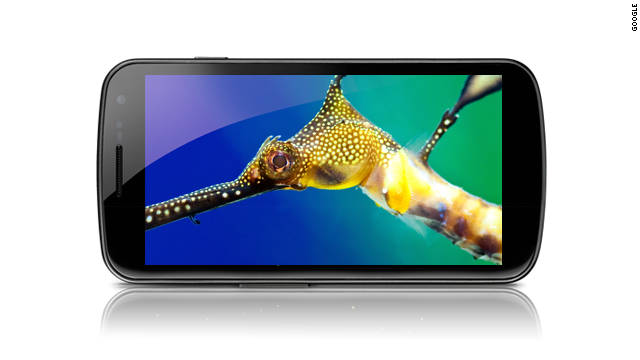With facial recognition, Google pins hopes on Galaxy Nexus
| |

(CNN) -- Apple gave you FaceTime. Now Google is countering with Face Unlock.
Google teamed up with Samsung this week to unveil the Galaxy Nexus, an ambitious smartphone they hope will make a run at the iPhone while serving up Ice Cream Sandwich, a new version of Google's Android mobile operating system.
Released Wednesday in the wake of the iPhone 4S's big splash, the Galaxy Nexus is the first phone designed specifically to run Android 4.0. It's scheduled to go on sale in November, although pricing hasn't been announced. In Google fashion, the phone's software has its own tasty-treat nickname.
Read: Why does Google name its Android products after desserts?
And while Google keeps maintaining that all phone makers get equal access to its Android releases, it's clear that the company has a special place in its heart for the Galaxy Nexus, and possibly even hopes of a flagship phone to challenge the crowd from Cupertino.
"Galaxy Nexus isn't just a smartphone -- it's beyond smart," Google Senior Vice President Andy Rubin wrote on the company's blog. "Ice Cream Sandwich gives you complete control over the amount of mobile data you use by helping you better understand and manage it."
One of the new system's fanciest features, shown off at an unveiling Wednesday in Hong Kong, is Face Unlock. Thanks to facial recognition software, the feature lets users unlock the phone by showing it their face instead of tapping out a password.
(It's worth noting that, in awkward fashion, it took two or three tries to get Face Unlock to work during a demo at the Hong Kong event. Until that happens in the real world, we'll give them the same opening-day pass that Steve Jobs got for iPhone 4 connection glitches).
It also has what's being called Google Beam, an app that lets users share contacts, apps, websites and other data between two Android phones by simply holding them near each other.
And while there's nothing as sexy as Siri, the iPhone 4S's voice-activated "personal assistant," the phone does feature "voice typing," which allows users to speak to create text messages, e-mails and the like.
The Galaxy Nexus features a big, 4.65-inch display screen (the new iPhone 4S's is 3.5 inches), 32 GB of storage and a dual-core 1.24 GHz processor.
It has a 5-megapixel camera, which is on par with the iPhone 4 but lags behind the 4S's 8-megapixel version. Google and Samsung counter with claims of zero shutter lag (a frequent iPhone complaint), autofocus and panoramic photo capabilities.
Early response to the phone, and the operating system, has been positive.
"While hardware junkies like myself may have spent the past few weeks drooling over the Galaxy Nexus, the onstage demo of Android 4.0 Ice Cream Sandwich proves that the software powering the device is just as impressive," Chris Velazco wrote for TechCrunch.
Google says that Ice Cream Sandwich is the first operating system optimized for both smartphones and tablets. They say it has dramatically improved the touchscreen keyboard, made notifications more interactive and created resizable widgets, among other upgrades.
All of which is well and good, of course. But the question remains: Is this the phone to go head-to-head with the market's 800-pound gorilla, the iPhone?
The Android system as a whole has come on like gangbusters. Phones running the system make up about 43% of the multibillion-dollar smartphone market, compared with the iPhone's 18%. But that's spread out over dozens of phones from multiple manufacturers and ranges from top-of-the-line offerings to cheap, slapped-together handhelds.
Google basically takes bids each year for a manufacturer to make its Nexus phone. That's after the company's attempt to produce its own, the Nexus One, fizzled and died in remarkably short order.
No single Android phone has captured the public's imagination like the iPhone, a fact that Google would love to change.
"Ice Cream Sandwich could provide the critical push in the race to catch Apple," Mark Newman, an analyst at Sanford C. Bernstein & Co., who is based in Hong Kong, told Bloomberg Businessweek. "Apple's software is still on the cutting edge."
Không có nhận xét nào:
Đăng nhận xét